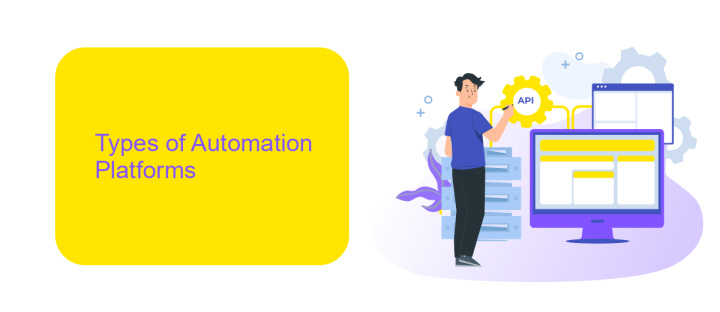Automation Platform Meaning
An automation platform is a comprehensive suite of tools and technologies designed to streamline and enhance business processes through automation. By integrating various applications and systems, these platforms enable organizations to reduce manual efforts, increase efficiency, and improve accuracy. In today's fast-paced digital landscape, understanding the role and capabilities of automation platforms is crucial for businesses aiming to stay competitive and drive innovation.
What is an Automation Platform?
An automation platform is a comprehensive software solution designed to streamline and optimize various processes by automating repetitive tasks. These platforms serve as a centralized hub where businesses can integrate different tools and technologies to enhance efficiency and productivity. By leveraging automation, organizations can reduce manual efforts, minimize errors, and accelerate workflows, ultimately contributing to improved operational performance.
- Task Automation: Automate routine tasks to save time and resources.
- Integration: Connect disparate systems and applications seamlessly.
- Scalability: Easily scale operations as business needs grow.
- Analytics: Gain insights through data collection and analysis.
- Customization: Tailor automation processes to specific business requirements.
Automation platforms are becoming increasingly vital in the modern business landscape, enabling companies to remain competitive and agile. They offer a flexible and scalable approach to managing complex processes across various departments, from marketing and sales to IT and customer service. By adopting such platforms, businesses can focus more on strategic initiatives and innovation, rather than getting bogged down by routine operational tasks.
Types of Automation Platforms

Automation platforms come in various forms, each designed to streamline specific processes and enhance efficiency across different sectors. One common type is the business process automation (BPA) platform, which focuses on automating repetitive tasks and workflows within an organization. These platforms can handle tasks such as data entry, email responses, and report generation, freeing up employees to focus on more strategic activities. Another type is the robotic process automation (RPA) platform, which uses software robots to mimic human actions and interact with digital systems. RPA is particularly useful for automating rule-based tasks, such as invoice processing and customer service interactions.
Integration platforms as a service (iPaaS) are also a significant category, providing tools to connect disparate systems and applications seamlessly. These platforms enable organizations to automate data flow between different software, enhancing communication and reducing manual data handling. ApiX-Drive is an example of an iPaaS that simplifies the integration process, allowing businesses to connect various apps and services without extensive coding knowledge. By leveraging such automation platforms, companies can achieve greater operational efficiency and agility, adapting swiftly to changing market demands.
Benefits of Automation Platforms

Automation platforms have become essential tools for businesses aiming to streamline operations and enhance productivity. By integrating various processes into a single system, these platforms enable organizations to reduce manual tasks, minimize errors, and improve overall efficiency. As a result, companies can focus more on strategic initiatives rather than routine operations.
- Increased Efficiency: Automation platforms eliminate repetitive tasks, allowing employees to concentrate on more critical activities.
- Cost Reduction: By minimizing manual intervention, businesses can significantly reduce labor costs and operational expenses.
- Enhanced Accuracy: Automated processes reduce the likelihood of human error, ensuring more reliable and consistent outcomes.
- Scalability: These platforms can easily adapt to growing business needs, supporting expansion without requiring significant additional resources.
Incorporating automation platforms into business operations not only optimizes workflow but also provides a competitive edge in today's fast-paced market. By leveraging these tools, companies can achieve greater agility and responsiveness, ultimately driving growth and innovation. As technology continues to evolve, the adoption of automation platforms will likely become even more crucial for sustained success.
How to Choose an Automation Platform

Choosing the right automation platform is crucial for enhancing your business processes and achieving operational efficiency. With numerous options available, it can be challenging to determine which platform best suits your needs. Start by evaluating your specific requirements and objectives. Consider the tasks you want to automate and the outcomes you expect.
Next, assess the platform's compatibility with your existing systems. An ideal platform should integrate seamlessly with your current software and tools, minimizing disruptions. Additionally, consider the scalability of the platform. As your business grows, your automation needs may evolve, so it's essential to choose a solution that can expand with you.
- Identify your key automation goals.
- Ensure compatibility with existing systems.
- Consider scalability for future growth.
- Evaluate user-friendliness and support.
- Review security features and compliance.
Finally, take into account the platform's user-friendliness and the level of support offered by the provider. A platform that is easy to use and comes with robust customer support can significantly enhance your automation journey. By carefully considering these factors, you can select an automation platform that aligns with your business objectives and drives success.
- Automate the work of an online store or landing
- Empower through integration
- Don't spend money on programmers and integrators
- Save time by automating routine tasks
The Future of Automation Platforms
The future of automation platforms is poised for significant transformation as technology continues to evolve at a rapid pace. With advancements in artificial intelligence and machine learning, automation platforms are becoming more intelligent and capable of handling complex tasks with minimal human intervention. These platforms are expected to integrate seamlessly with various business processes, offering enhanced efficiency and productivity. As businesses strive for digital transformation, the demand for robust and adaptable automation solutions will only increase, driving innovation in this space.
Moreover, the future will see automation platforms becoming more accessible and user-friendly, enabling businesses of all sizes to leverage their capabilities. Services like ApiX-Drive are leading the charge by simplifying the integration process, allowing companies to connect different applications and automate workflows effortlessly. This ease of integration will empower organizations to optimize operations and focus on strategic initiatives. As automation platforms continue to evolve, they will play a crucial role in shaping the future of work, fostering a more connected and efficient business ecosystem.
FAQ
What is an automation platform?
How do automation platforms work?
What are the benefits of using an automation platform?
How can an automation platform be implemented in a business?
What types of tasks can be automated using an automation platform?
Time is the most valuable resource in today's business realities. By eliminating the routine from work processes, you will get more opportunities to implement the most daring plans and ideas. Choose – you can continue to waste time, money and nerves on inefficient solutions, or you can use ApiX-Drive, automating work processes and achieving results with minimal investment of money, effort and human resources.


